Prison-based gerrymandering is destructive to the families of incarcerated individuals. The NJ State legislator is trying to end this practice #p2
Commissary Kitchen, a prison cookbook by a Mobb Deep rapper

A new cookbook is on the market about which its prison chef author Prodigy Johnson of the rap group Mobb Deep writes, “This book won’t make you a better cook, but it might make you a better person.”
Knowing what to eat and how to make it is evidently such an important part of prison life that there’s an entire cottage industry of cookbooks written on the subject. Inmate survival guides often have a section on food and how to use the commissary to augment prison diets. Commissary Kitchen: My Infamous Prison Cookbook, which will be published this month, is written by Prodigy and journalist Kathy Iandoli.
In the book, Prodigy describes how his lifelong battle with sickle cell made him hyper-conscious of what he ate while incarcerated.
“I couldn’t afford to get sick in prison,” he writes. “My sickle cell is no joke, so I couldn’t eat poorly or not exercise. And everything in jail is designed to do the exact opposite.” This is just a hint of what sets Commissary Kitchen apart from other books in the genre — it’s about Prodigy’s experience of prison as much, if not more than, about the food itself…
Good reasons to release non-violent offenders after basic sentence fulfillment

This testimony was given by a member of the Integrated Justice Alliance (IJA) to the Senate Judiciary Committee on 14 July 2016.
Chairman and Members of the Senate Judiciary Committee,
Good afternoon. My name is Anna “Cuqui” Rivera and I am here today representing the Integrated Justice Alliance (IJA). Founded in 2008, a statewide network working toward a fair, effective criminal justice system: one that promotes public safety, the restoration of individuals and families, protects and safeguards the rights of individuals in custody, promotes transparency, ensures accountability and spends taxpayer dollars wisely.
I urge you to vote yes on Senate Bill 895 which would allow for the release of certain nonviolent offenders after they have completed their basic sentence, provided that they have not committed any serious disciplinary infractions while incarcerated and have complied with rehabilitation recommendations.
Incarcerating a low-risk individual after they have completed their basic sentence wastes taxpayer money and reduces their chance of successful reentry and reintegration into the community upon their release. The United States spent 67 billion dollars on incarceration in 2015, but not on education or prevention. The overuse of incarceration tears apart vulnerable families and communities.
While African Americans and Latinos make up less than 30 percent of the New Jersey population, they account for more than 80 percent of those who are incarcerated. And racial disparities in New Jersey prisons are the highest in the nation.
In addition to the huge financial cost of imprisonment, research shows that long prison sentences do not enhance public safety or promote rehabilitation. Instead, they simply prolong the separation of incarcerated people from their families and communities, further compounding the challenges they will face in their inevitable reintegration.
At the moment, many minor administrative delays mean that low level offenders often remain in prison long after they are eligible for parole at a very high tax payer price.
As a criminal justice reform advocate, I see members of my community going to prison in record numbers, only to return and find themselves hopelessly and repeatedly discriminated against in legitimate labor and housing markets. So many would benefit from shorter sentences followed by release to case management, community and counseling services; this would allow them to more easily reconnect with family and work towards becoming positive and productive members of society.
Ensuring the safety and well-being of our community is one of IJA’s highest priorities. Lengthy and unnecessary terms of incarceration cannot serve these objectives. We believe that morality, fair play, and common sense require us to pass the S-895 to ensure a less discriminatory and effective justice system.
Protected: Tell the Census Bureau: Help inmate’s families get the aid the deserve and need
Video: Hillary Clinton’s record of racist alliances and real damage to black families

Very informative and disturbing video shows the positions Hillary Clinton has taken on issues that severely impact black communities. Or as curator Jeanette Johnson-Jing puts it: A summary of Hillary Clinton’s role in the recent history of African Americans… One viewer commented:
This is a most powerful piece. Before I knew it, the tears began rolling: they have to be “brought to heel”: the repetition and visuals… OMG!?
Sometimes I ask myself why black people would support this woman … it seems such a mystery in light of all that she and her husband have done to hurt the community. I guess the Clintons with their pretty talk and powerful rhetoric have convinced black and brown supporters to play blame the victim with them – as if doing so were a game rather than the destruction of hopes, dreams, lives and families.
Harry Belafonte endorses Sen. Sanders and asks America to:
…consider and reconsider what it is that Bernie Sanders offers. He offers us a chance to declare unequivocally that there is an America – there is a group of citizens – with a deep caring for where our nation goes and what it does in the process of going.
Amen, Mr. Belafonte
Hat tip to Norm Batchelor for the video find.
Prison-based gerrymandering brings in power & extra money to towns housing prisons
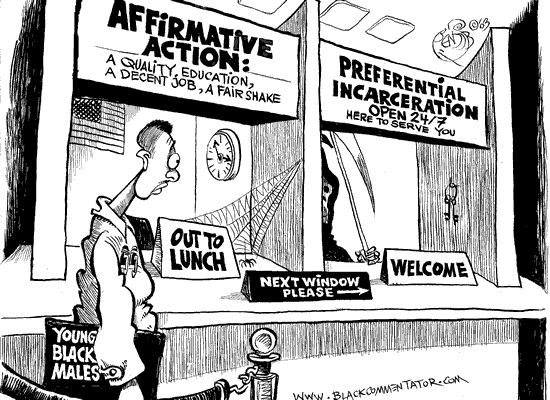
The political aspect of prison-based gerrymandering is often presented as being the only aspect of the phenomenon worth discussing. It’s important, of course, but so is the net financial and services gain to a community housing a prison when compared against the net financial and services loss to an inmate’s pre-incarceration community – the community where his children and other family members may still live. The direct negative financial and social impact of prison-based gerrymandering on an inmate’s true “home community” merits attention and discussion as much as the political aspect does.
The loss occurs when funding and services are diverted away from low-income homes where they are needed to provide for the security of single-parent youth and families; and land in the coffers of the financially stable community where an absent parent is being housed as a prison inmate.
In the 2011 Washington University Journal of Law & Policy report Locked Up and Counted Out: Bringing an End to Prison-based Gerrymandering, author John C. Drake makes these points:
D. Effect of Census Count on Redistricting
The policy of counting prisoners as residents of the communities in which they are imprisoned has profound consequences. It results in population data about communities—both the prison communities and the communities of origin—that, while relied on by policy makers, does not accurately reflect the needs of those communities.78 Depending on the specific state formula for distribution of tax revenue, counties with prisons can get bumps in education funding,79 sales tax revenue,80 and targeted funding for communities with sizable low-income populations.81 ?The imagination,? the Census Bureau itself has noted, ?is the only limit upon the use of the statistics that come out of the census.?82
… Critics such as the NAACP Legal Defense and Educational Fund have said that counting prisoners toward a community‘s population for redistricting purposes ?artificially inflates the population count—and thus, the political influence—of the districts where prisons and jails are located.?96 The increase in population attributable to prisoners in rural prison towns comes at the expense of the urban communities from which prisoners typically hail, a dynamic that has led critics to call the effect prison- based gerrymandering.97
78. See WAGNER ET AL., supra note 74, at 3 (?The result of counting large external populations of prisoners as local residents leads to misleading conclusions about the size and growth of communities . . . . Counties that see prisons close their doors report that their Census populations declined when in fact their actual population did not. Conversely, population growth reported by some counties is due to the importation of prisoners to a new correctional institution.?).
79. Lotke & Wagner, supra note 64, at 601.
80. WAGNER ET AL., supra note 74, at 8.
81. Lotke & Wagner, supra note 64, at 604–05.
82. U.S. CENSUS BUREAU, U.S. CENSUS BUREAU REPORT: STRENGTH IN NUMBERS:
YOUR GUIDE TO CENSUS 2010 REDISTRICTING DATA FROM THE U.S. CENSUS BUREAU (2010), available at http://www.census.gov/rdo/pdf/StrengthInNumbers2010.pdf.
96. NAACP LEGAL DEF. AND EDUC. FUND, CAPTIVE CONSTITUENTS: PRISON-BASED GERRYMANDERING & THE DISTORTION OF OUR DEMOCRACY (2010), available at http:// naacpldf.org/files/publications/captive_constituents.pdf.
97. The moniker was assigned because of the increased political influence attained by communities with prison populations. NAACP LEGAL DEF. AND EDUC. FUND, supra note 96; see also PRISONERS OF THE CENSUS, http://www.prisonersofthecensus.org (last visited Sept. 23, 2010).
Hillary and Bill Clinton and Joe Biden laid the groundwork for imprisoning 1% of America today
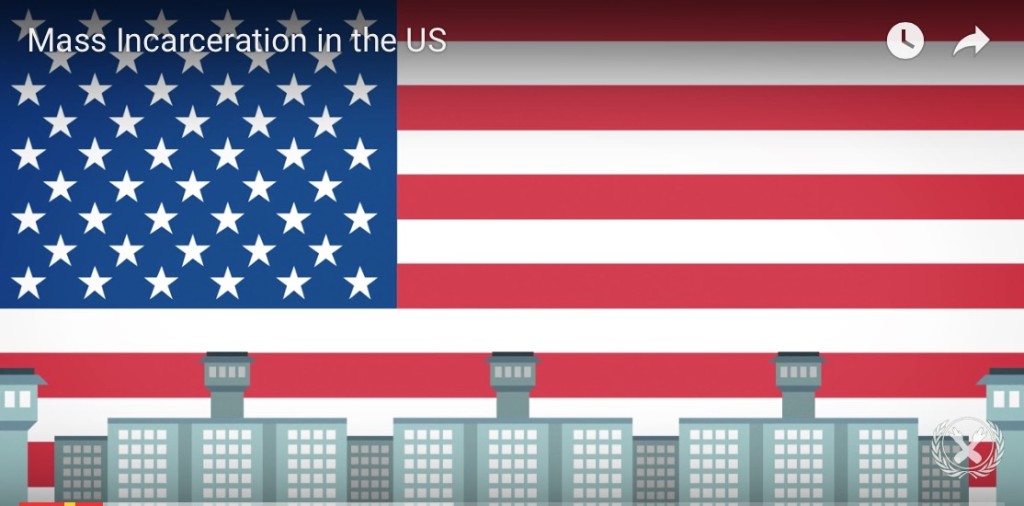
MotherJones describes Joe Biden’s relationship with mass incarceration as “complicated”. Biden helped put millions in prison & tightened noose on student loans. Intercept uses the same word to describes Hillary’s relationship and explains:
Hillary Clinton has a complicated history with incarceration. As first lady, she championed efforts to get tough on crime. “We need more police, we need more and tougher prison sentences for repeat offenders,” Clinton said in 1994. “The ‘three strikes and you’re out’ for violent offenders has to be part of the plan. We need more prisons to keep violent offenders for as long as it takes to keep them off the streets,” she added.
Exonerees robbed in prison of decades of their lives now work to free others

After watching the “True Conviction” trailer I put my head down on my desk and cried. What a terrible story – wrongfully convicted men exonerated after decades in jail, having lost the chance to raise and help their children – and to develop as members of society. This nightmare juxtaposed by the love for humanity this team embodies, men who have refused to turn their backs on others wrongfully imprisoned by a brutal and oppressive penal system. They call themselves Freedom Fighters and are led by Christopher Scott. Tambay A. Obenson writes:
Christopher Scott was released from prison after serving 13 years of a life sentence for a murder he didn’t commit. This sounds like a nightmare, but it’s more common than you might think. 32 people like Chris have been exonerated in Dallas. Most of them are black men who were locked up in their youth and emerged in middle age looking for a way to make sense of what happened. One day at an exoneree support group meeting, an idea came to Chris: exonerees could become detectives, find other wrongfully convicted people sitting in prison, investigate their cases and prove their innocence. “I’m the go-getter, I’m the one that sets the standards, because I’m a leader – I lead by example.” Chris was recently named Texan of the Year by the Dallas Morning News.
The People won prison phone justice today – thanks FCC!
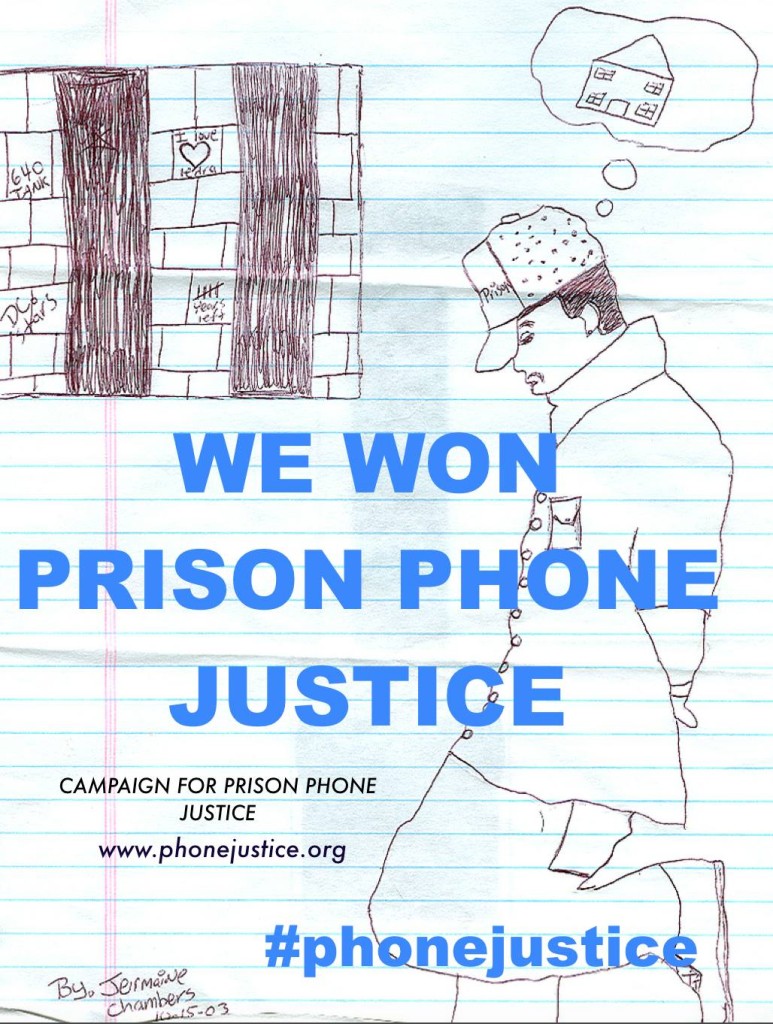
What kind of a nation would lock up 10% of its adult population long term for minor crimes like smoking a marijuana joint or stealing a jacket … and on top of that, make calling home so expensive for prisoners it became virtually impossible?
Well, that would be the United States of America – until this morning, that is, when the FCC voted to make prison calls affordable. Thank you for heading up this valuable initiative Commissioner Mignon Clyburn.
Today (Thursday, 21 October 2015), the Federal Communications Commission voted 3-2 to cap the rates and fees companies charge those families struggling to keep in touch with incarcerated relatives by phone. That change came as a direct result of mounting pressure from groups across the country.
The new cap could represent a 50% drop in prison phone call costs. State and federal prison phone rates will be capped at 11 cents a minute. Jail rates will be capped anywhere from 14 to 22 cents per minute.
1% of US population in prison and they have 70-100% occupancy guarantees
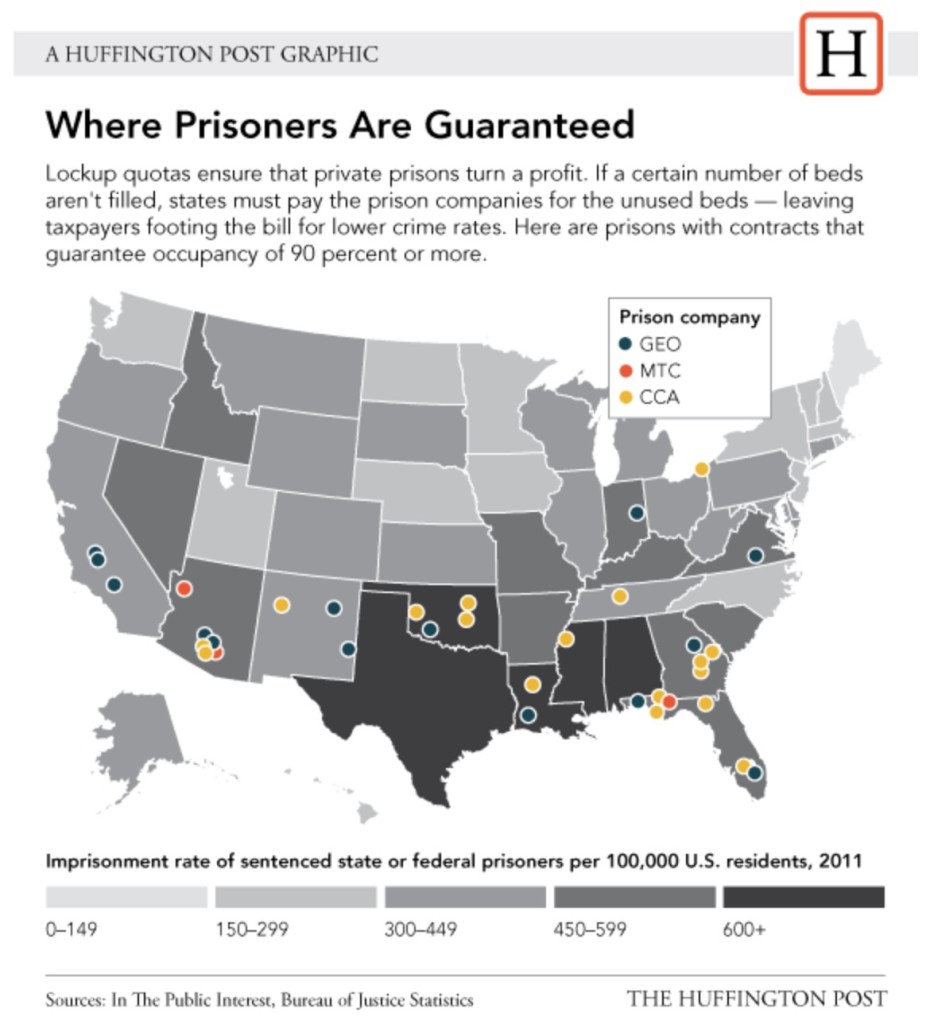 This is totally bizarre and should be unbelievable: about 1% (1 in 100) of the US population is in prison at any given time these days … and a growing number of prisons have contracts with state governments guaranteeing them occupancy rates as high as 100%. When inmate populations drop below the contracted rate, private prison contractors get their money by threatening to sue. Huffpost explains:
This is totally bizarre and should be unbelievable: about 1% (1 in 100) of the US population is in prison at any given time these days … and a growing number of prisons have contracts with state governments guaranteeing them occupancy rates as high as 100%. When inmate populations drop below the contracted rate, private prison contractors get their money by threatening to sue. Huffpost explains:
Arizona’s contractually obligated promise to fill prison beds is a common provision in a majority of America’s private prison contracts, according to a public records analysis released today by the advocacy group In the Public Interest. The group reviewed more than 60 contracts between private prison companies and state and local governments across the country, and found language mentioning quotas for prisoners in nearly two-thirds of those analyzed.
The prison bed guarantees range between minimums of 70 percent occupancy in a California prison to 100 percent occupancy requirements at some Arizona prisons. Most of the contracts had language mandating that at least 90 percent of prison beds be filled.
There are ways to handle social problems that have proved less costly and more effective. Keep in mind:
Biden helped put millions in prison & tightened noose on student loans

All I can tell my fellow Dems is: if you want a true democracy in the United States, vote for Bernie Sanders because the competition ain’t looking so good. I’m sorry to report some disturbing facts I’ve learned about our Vice President, Joe Biden, who seems not to be the egalitarian playing-field leveler that his media image portrays him to be.
Along with Bill Clinton, Biden helped drastically increase the United States prison population. According to the ACLU 1 in 99 US adults are living in prison and, “One in 31 adults are under some form of correctional control, counting prison, jail, parole and probation populations.”
It should be pointed out that while being far to the left politically might seem incompatible with investing in prisons (or managing a hedge fund in the first place), the Democratic party is totally fine with the incarceration rate. Although Richard Nixon and Ronald Reagan are largely responsible for the drug-war policies that caused the prison population to skyrocket, Bill Clinton was a “tough on crime” president who continued their ideas. And Vice President Joe Biden was a principal player in the Clinton era’s crime policies—he wrote the Violent Crime Control and Law Enforcement Act.
The cost of “tough on crime” is $1B each year of your taxpayer money
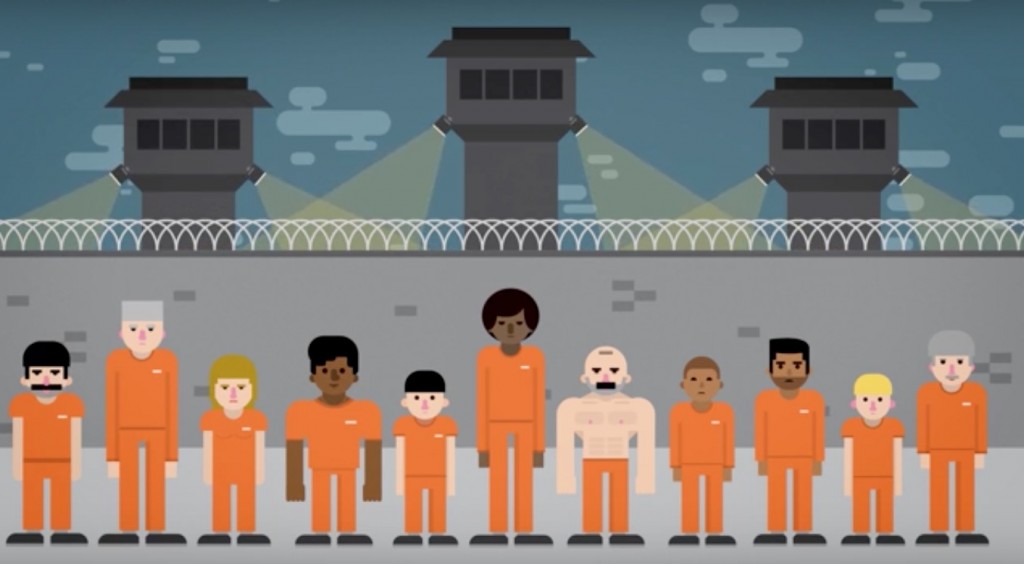 vlogbrothers has created a sobering video about the “massive $75 BILLION per year failed experiment” we’re living in – which is what it costs American taxpayers each year to keep almost 1% of our neighbors in prison.
vlogbrothers has created a sobering video about the “massive $75 BILLION per year failed experiment” we’re living in – which is what it costs American taxpayers each year to keep almost 1% of our neighbors in prison.
The video’s done in a light-hearted animation style and is under 4 minutes long, but pay attention to the scary statistics:
Big Brands making a killing from inmate labor, a slavery replacement
 Very neatly written exposition of how prisons have replaced slavery as a means of augmenting the wealthy of the wealthy – on the backs of society’s most vulnerable.
Very neatly written exposition of how prisons have replaced slavery as a means of augmenting the wealthy of the wealthy – on the backs of society’s most vulnerable.
“Insourcing,” as prison labor is often called, is an even cheaper alternative to outsourcing. Instead of sending labor over to China or Bangladesh, manufacturers have chosen to forcibly employ the 2.4 million incarcerated people in the United States. Chances are high that if a product you’re holding says it is “American Made,” it was made in an American prison.
On average, prisoners work 8 hours a day, but they have no union representation and make between .23 and $1.15 per hour, over 6 times less than federal minimum wage. These low wages combined with increasing communication and commissary costs mean that inmates are often released from correctional facilities with more debt than they had on their arrival. Meanwhile, big businesses receive tax credits for employing these inmates in excess of millions of dollars a year.
Disturbing inequity of the School-to-Prison-Pipeline (short video)
* From NAACP Criminal Justice Fact Sheet: Combining the number of people in prison and jail with those under parole or probation supervision, 1 in every 31 adults, or 3.2% of the (USA) population is under some form of correctional control.
Attend info session for NJ’s non-violent fugitive Safe Surrender program
 Two information sessions for November’s Fugitive Safe Surrender program are being held 6:30-8:30pm on Thursday, Oct. 17 in Hackensack and Tuesday, Oct. 22 in Paterson, NJ. Faith workers, community and re-entry advocates, criminal justice students and attorney volunteers will want to attend a session to learn directly from experts handling the program, what it can do for non-violent offender law fugitives. Volunteer needs and opportunities will also be discussed. Law and criminal justice student volunteers will gain valuable insights into the legal system and CE credits will be issued to attorney volunteers.
Two information sessions for November’s Fugitive Safe Surrender program are being held 6:30-8:30pm on Thursday, Oct. 17 in Hackensack and Tuesday, Oct. 22 in Paterson, NJ. Faith workers, community and re-entry advocates, criminal justice students and attorney volunteers will want to attend a session to learn directly from experts handling the program, what it can do for non-violent offender law fugitives. Volunteer needs and opportunities will also be discussed. Law and criminal justice student volunteers will gain valuable insights into the legal system and CE credits will be issued to attorney volunteers.
Fugitive Safe Surrender is not an amnesty program. But, it is a chance for law fugitives to regain control over their lives; clear away outstanding warrants; and become eligible to renew driver’s licenses, apply for social service programs and arrange low dollar payment plans for back child support and court ordered fines. The program is administered by the New Jersey Attorney General, with the support of Bergen, Passaic and Hudson County and their partners, and it will be held November 6-9, 2013 at a Jersey City church.
New Jersey residents with outstanding arrest warrants for non-violent offenses, who are either US citizens or green card holders, can participate in this program and secure the opportunity to stop hiding from the law and get phenomenal help to positively transform their lives. 13,276K people received same-day clearing of arrest warrants when this program last ran in 2008, and this year’s program is expected to follow along similar lines. 99% of those who surrendered in 2008 were released the same day with their societal privileges fully restored and less than 1% of applicants were taken into custody because a history of serious offenses made them ineligible for participation.
 This year, once participants’ warrants have been cleared by volunteer judges who will be approving and filing agreements right on site, participants will meet with staff from social service agencies and the NJ Motor Vehicle Commission. They will have the chance to – right on the spot – renew driver’s licenses and get help filling out applications for LI-HEAP (assistance paying heat bills) and other aid. Volunteer lawyers will help participants prepare the paperwork to enter into probation programs or agreements for paying outstanding child support or court ordered fines. Participants will be given the chance to make small monthly payments they can afford.
This year, once participants’ warrants have been cleared by volunteer judges who will be approving and filing agreements right on site, participants will meet with staff from social service agencies and the NJ Motor Vehicle Commission. They will have the chance to – right on the spot – renew driver’s licenses and get help filling out applications for LI-HEAP (assistance paying heat bills) and other aid. Volunteer lawyers will help participants prepare the paperwork to enter into probation programs or agreements for paying outstanding child support or court ordered fines. Participants will be given the chance to make small monthly payments they can afford.
The goal of Fugitive Safe Surrender is to relieve several thousand New Jersey residents from the stress and challenges of living in legal limbo due to outstanding arrest warrants by giving them an opportunity to clear away warrants, normalize their lives and increase their employment opportunities. Not only individuals, families and communities will benefit: law enforcement officers and courts will also gain more time to focus on serious criminal offenders once the records of people with minor offenses have been cleared from the system.
Hackensack Fugitive Safe Surrender Information Session
Thursday 17 Oct 2013 | 6:30-8:30pm
Ciarco Learning Center (of Bergen Community College)
355 Main Street – Room 134 – Hackensack, NJ
(Free Parking Behind Building)
Download flier
Paterson Fugitive Safe Surrender Information Session
Tuesday 22 Oct 2013 | 6:30-8:30pm
Rogers Conference Center
32 Spruce Street (rear) – 2nd Floor – Paterson, NJ
(Parking at 75 Spruce Street-enter on Grand Street side)
Download flier
For more information and to volunteer at the surrender event, contact Margaret Anastos:
973-504-6241 or 6317 or 6441 | AnastosM@dca.lps.state.nj.us
The surrender event itself will take place:
Wed/Mier Nov 6 2013 9am-4pm
Thurs/Jueves Nov 7 2013 9am-4pm
Fri/Vier Nov 8 2013 9am-4pm
Sat/Sáb Nov 9 2013 9am-4pm
At Evangelismos Greek Orthodox Church
661 Montgomery St, Jersey City, New Jersey 07306
Fugitive Safe Surrender 2013 Fact Sheets
English
Fugitive Safe Surrender 2013 Program Facts
Fugitive Safe Surrender 2013 Q & A sheet
Español
Acerca del Programa de Delincuente Entrega Protegida 2013.es
Delincuente Entrega Protegida 2013 Preguntas y Respuestas.es
Written by Kimi Wei kimi@thewei.com Facebook @kimiwei

